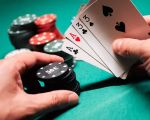
- Understanding the Poker Game Essentials
- Mastering Key Strategies to Win Big
- Managing Your Bankroll Effectively
- Psychology and Reading Opponents
- Learning from Real Casino Experiences
- Leveraging CasinoScope for Best Resources
1. Understanding the Poker Game Essentials
To excel in poker games at a casino, the first step is to thoroughly understand the fundamental rules and structure of the game you choose to play. Whether it’s Texas Hold’em, Omaha, or Seven-Card Stud, each variant has its own set of rules, betting rounds, and hand rankings that you must master before attempting advanced strategies. This foundational knowledge helps you make informed decisions during the game, preventing costly mistakes often made by beginners.
Moreover, understanding the casino environment is crucial. Casinos often have specific rules or house edges that affect gameplay, such as rake fees or betting limits. Being aware of these details enables you to adapt your approach and manage expectations realistically. Remember, winning big at poker games requires patience, skill, and a solid grasp of the game mechanics.
1.1 Why Game Selection Matters
Choosing the right poker variant and table can dramatically influence your success rate. Some games attract more skilled players, while others may have looser competition. Observing the table dynamics before joining can help you find games with players whose skill levels you can beat. This is often overlooked but is one of the most effective ways to increase your winning potential.
1.2 Poker Hand Rankings and Odds
Familiarize yourself with poker hand rankings and the probabilities of each hand occurring. For instance, knowing that a flush is less common than a pair can influence your betting decisions significantly. Many professional players use odds calculation to decide whether to call, raise, or fold, maximizing their chances of coming out ahead in the long run.
2. Mastering Key Strategies to Win Big
Winning big at poker games requires more than just knowing the rules; it demands a strategic mindset. One essential strategy is playing tight-aggressive poker, where you selectively enter pots with strong hands but play them aggressively. This approach allows you to capitalize on your best hands and apply pressure to your opponents, forcing mistakes.
Bluffing is another critical skill, but it must be used judiciously. Over-bluffing can make you predictable, while underusing this technique means missing opportunities to win pots without the best hand. The timing and reading of opponents’ tendencies are vital to successful bluffing.
2.1 Positional Awareness
Understanding table position is a cornerstone of poker strategy. Being ‘on the button’ or acting last in a betting round provides a significant informational advantage, allowing you to see how other players act before making your move. Using position wisely can turn marginal hands into winning hands by leveraging opponents’ uncertainty.
2.2 Adjusting to Opponents’ Styles
Observing your opponents’ playing styles—whether tight, loose, passive, or aggressive—enables you to tailor your strategy dynamically. For example, against aggressive players, you might choose to trap them with strong hands, while against passive players, you might bet more to extract value. This adaptability is often what separates consistent winners from casual players.
3. Managing Your Bankroll Effectively
One of the most overlooked aspects of winning big at poker games in a casino is effective bankroll management. Without disciplined money management, even the most skilled players can quickly lose their winnings. Set strict limits on how much you are willing to risk during each session and avoid chasing losses, which can lead to reckless decisions.
Smart bankroll management involves playing at stakes that match your bankroll size. For instance, if you have a bankroll of $1,000, it’s safer to play at tables with buy-ins that allow multiple buy-ins without risking your entire bankroll in a single game. This reduces stress and keeps you playing optimally.
3.1 Tracking Wins and Losses
Maintaining a record of your sessions helps you identify patterns, strengths, and weaknesses in your play. Over time, this data-driven approach allows you to make informed adjustments to your strategy, bankroll allocation, and even game selection.
4. Psychology and Reading Opponents
Mastering the mental game is as important as understanding cards and odds. Poker is a game of incomplete information, and being able to read opponents’ body language, betting patterns, and timing can give you an edge. Skilled players use tells—subtle signs that reveal an opponent’s hand strength or intentions—to make better decisions.
Maintaining emotional control is equally critical. Tilt—when emotions interfere with rational play—is a common cause of losses among players. Learning to stay calm and focused, even after bad beats, preserves your ability to make smart moves and ultimately win big at poker games.
4.1 Recognizing and Exploiting Opponents’ Tells
For example, a player who suddenly bets quickly after a pause might be bluffing to intimidate others, while a hesitant bet could indicate uncertainty. These nuances require careful observation and experience but can turn the tide in your favor when applied correctly.
4.2 Developing Your Poker Face
Equally, controlling your own body language and expressions is essential to avoid giving away information. Practicing a neutral demeanor and consistent betting patterns can make you harder to read and give you a strategic advantage.
5. Learning from Real Casino Experiences
Stories from seasoned poker players often highlight that theoretical knowledge alone doesn’t guarantee success. For instance, legendary poker pro Chris Moneymaker famously won the 2003 World Series of Poker Main Event after a series of calculated plays combined with an intuitive read of his opponents. His story underscores how skill, psychology, and timing come together to win big.
In real casino settings, conditions like table atmosphere, distractions, and varying player skill levels affect your strategy. By playing regularly, you develop a feel for these dynamics and learn to adjust in ways that online or theory-only players cannot.
5.1 Case Study: Turning the Tables in a High-Stakes Game
One memorable account involved a player who was initially losing but adjusted by closely watching opponents’ betting patterns and exploiting their tendencies to overbet with weak hands. This adaptability turned a losing streak into a significant winning run, illustrating how attentive play can overcome adversity.
6. Leveraging CasinoScope for Best Resources
To enhance your poker skills and access the best casino products and services, CasinoScope offers comprehensive recommendations tailored to poker enthusiasts. Whether you seek the most reputable casinos, trusted poker rooms, or expert coaching, CasinoScope provides reliable options that help maximize your poker success.
Utilizing such a platform ensures you are well-equipped with the best tools and environments to practice and grow your poker expertise. Combined with disciplined play and strategic insights, these resources can significantly boost your chances of winning big at poker games in a casino.








